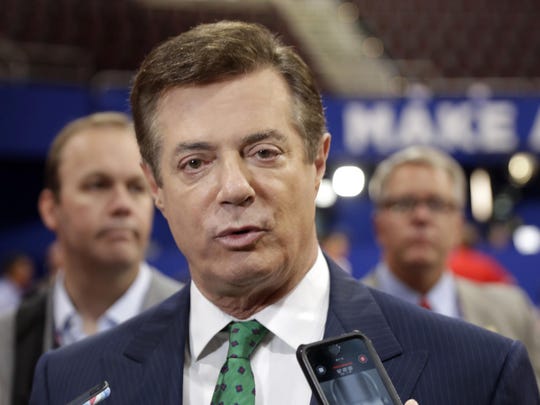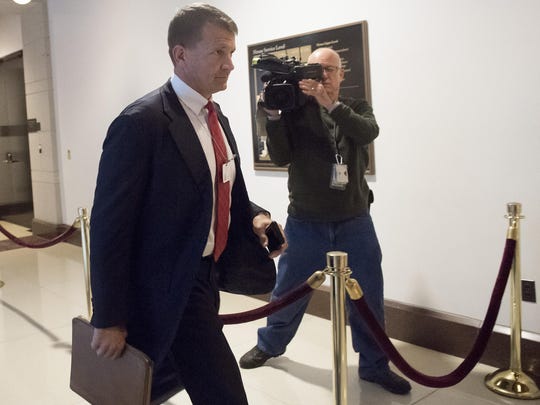| "French fries are easier to eat on a plane." |
Please place your seats in the upright position, fasten your seat belts, and break out with the cocktails & popcorn.
#perkinscoiesucks
#sayhisname
A Michigan reference in the long-anticipated Mueller report might shed some light on the targeting of the state by Russian entities seeking to influence the 2016 presidential election in favor of then-candidate Donald Trump.
Special counsel Robert Mueller's 400-plus-pages report revealed new details about outside interference in the 2016 election, but found no evidence of a conspiracy between the Trump campaign and Russia.
Mueller also said he could not conclusively determine whether Trump had obstructed the investigation but documented the Republican president’s attempts to seize control of the probe and even have Mueller dismissed in June 2017.
 |
| Paul Manafort |
At the time in August 2016, Manafort was still in charge of Trump's campaign.
"Manfort briefed Kilimnik on the state of the Trump campaign and Manafort’s plan to win the election," including the campaign's messaging and internal polling data, Mueller wrote.
"It also included discussion of 'battleground' states, which Manafort identified as Michigan, Wisconsin, Pennsylvania and Minnesota."
Manafort reportedly didn't refer explicitly to "battleground" states in his recounting of the Aug. 2 meeting; rather Mueller's source for that information was former campaign aide Rick Gates.
Michigan, Wisconsin and Pennsylvania were competitive swing states in 2016 that Trump narrowly won. They were also where Russia’s Internet Research Agency concentrated its efforts on social media and digital ads.
The content from the IRA and other Russian entities, some containing anti-Muslim messages, were intended to sow discord and disproportionately targeted Michigan and Wisconsin in 2016, among other states.
Manafort has not been charged with crimes related to his work for Trump. He pleaded guilty to witness tampering and was convicted of lobbying-related financial crimes and was recently sentenced to 7.5 years in prison.
While Mueller's team did not find evidence of collusion to support criminal charges, the investigation “identified numerous links between individuals with ties to the Russian government and individuals associated with the Trump campaign,” the special counsel said in the report.
Trump campaign members and surrogates promoted dozens of tweets, posts and other content created by the Internet Research Agency — one of the three Russian entities named in a 2018 indictment that included charges against 13 Russian nationals, according to the report.
On Nov. 7, one day before the 2016 election, Donald Trump Jr. retweeted a Detroit-related message from an IRA-controlled Twitter account.
His dad capped his winning 2016 campaign later that night with a massive rally in Grand Rapids.
“Detroit residents speak out against the failed policies of Obama, Hillary & democrats #ImGoingToMissObamaBecause,” said the tweet from the Pamela_Moore13 account.
The message, retweeted by Trump Jr., included a link that is no longer active but appears to have been a video, according to a version posted to a Trump section on Reddit, a popular social sharing website.
The Washington Post first reported on the Detroit tweet after reviewing interactions between people close to Trump and Russian Twitter “troll” accounts publicly identified in 2018 by U.S. Rep. Adam Schiff, a California Democrat who now chairs the House Intelligence Committee.
Pamela_Moore13 claimed to be a Texas-based Trump supporter, but the account was actually controlled by the IRA, according to Mueller, who said the group “engaged in an ‘active measures’ social media campaign to interfere in the 2016 presidential election.”
It’s not clear Trump Jr. had any idea he was amplifying a fake account, and he was not alone in doing so. U.S. media outlets “also quoted tweets from IRA-controlled accounts and attributed them to the reactions of real U.S . persons,” according to Mueller.
His report cited a Columbia Journalism Review article by researchers at the University of Wisconsin-Madison.
The researchers found at least one tweet from an IRA account embedded in coverage on 32 major media outlets, “like The Washington Post, NPR, and the Detroit Free Press, as well as in more recent, digitally native outlets such as BuzzFeed, Salon, and Mic."
The Mueller report also features several referenced to Erik Prince, a businessman and Michigan native who is brother to U.S. Secretary of Education Betsy DeVos.
While he was not part of the campaign, Prince had relationships with several Trump officials, including strategist Steve Bannon.
Prince met with transition team leaders after the election and in January 2017 traveled to the Seychelles, an archipelago country in the Indian Ocean, to meet with Kirill Dmitriev, head of the Russian Direct Investment Fund who reported directly to President Vladimir Putin, according to the report.
George Nadar, an adviser to the United Arab Emirates's crown prince, helped set up the meeting and told Prince “the Russians were looking to build a link with the incoming Trump Administration.”
Dmitriev was not convinced Prince was a legitimate intermediary, but Nader told him Price was “very very well connected and trusted by the New Team” and noted “his sister is now a Minister of Education.”
 |
| Erik Prince, brother of Betsy DeVos |
Prince later told investigators he briefed Bannon on the meeting. But Bannon told the special counsel’s office he never talked to Prince about anything involving Dmitriev or meetings with anyone associated with Putin.
Bannon told Mueller’s team he would have objected to such a meeting if he’d known about it.
Their “conflicting accounts” could not be “independently verified by reviewing their communications” because messages from that time period no longer existed on Prince or Bannon’s electronic devices, according to Mueller. Phone records show they had messaged several times.
Regardless, Prince told investigators Bannon instructed him not to follow up with Dmitriev and said he felt Bannon was “uninterested” in the matter.
Voting is beautiful, be beautiful ~ vote.©
No comments:
Post a Comment